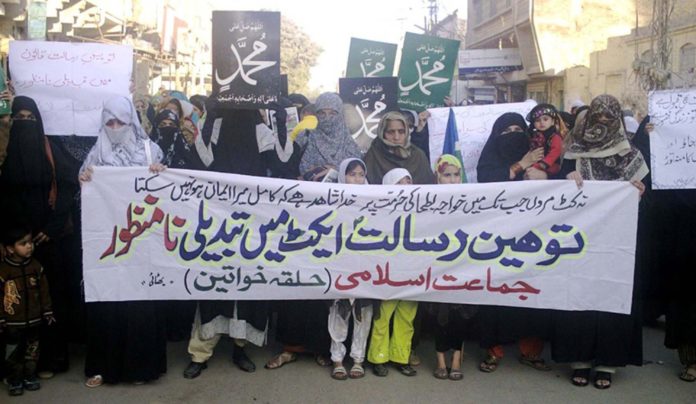The Pakistani National Assembly has passed a criminal law which includes increasing the punishment for those who use derogatory remarks against members of Prophet Muhammad’s (pbuh) family, wives, companions and certain caliphs to at least 10 years prison.
The punishment is part of the Criminal Laws Amendment Act 2023, supported by Islamic party Jamaat-i-Islami, which was passed unanimously last week even though there was not a quorum.
Under the new legal changes, sentences for those convicted of insulting the Prophet Muhammad’s (pbuh) wives, companions or close relatives could even be extended to life, along with a fine of one million rupees.
Pakistani law already prescribes capital punishment for anyone deemed to have insulted Islam and the Prophet (pbuh).
The parliament’s deputy speaker, Zahid Akram Durrani, called the legislation “historic” as he congratulated lawmakers for carrying out what many saw as their religious duty.
“The punishment for disrespecting these sacred personalities was almost nil earlier,” said Abdul Akbar Chitrali, a lawmaker belonging to Jamaat-i-Islami and author of the bill.
Jahangir Mohammed, director of the Ayaan Institute think tank, told 5Pillars that anti-hate laws in Pakistan are necessary.
Subscribe to our newsletter and stay updated on the latest news and updates from around the Muslim world!
“All societies need laws which promote social harmony and which outlaw incitement to people’s sacred beliefs,” he said. “Pakistan has had lots of issues relating to sectarian and religious hatred from extreme elements – both Sunni and Shia – so some kind of religious incitement laws are necessary to maintain peace and harmony and to clamp down on the worst excesses. And I’d rather have modern anti-hate laws than the antiquated British era blasphemy laws.”
He added: “But obviously given that this is Pakistan and laws are often used for political vendettas and score-settling, laws have to be proportionate and properly applied and not used for political purposes.”
On the other hand, an editorial in Pakistan’s Dawn newspaper expressed concern that the law would be open to misuse and could be used to target Shia Muslims in particular.
It said: “Instead of curbing sectarianism, the law will likely be weaponised disproportionately against religious minorities and sects. For example, by passing such legislation, even an informed discussion on Islamic history – fully within the bounds of respect – may be misinterpreted by some as an affront to revered personalities.
“While derogatory remarks against the Holy Prophet and his wives are unacceptable, expanding the ambit through vaguely worded laws can lead to misuse of such legislation.
“The fact is that confessional differences have existed in the Muslim world for 14 centuries, and the views of any one group cannot be imposed on all. In order to eliminate sectarianism, it should be the responsibility of Shia and Sunni ulema to preach tolerance and advise their flocks not to indulge in toxic polemics.
“Instead of passing debatable laws, the state needs to crack down on violent hatemongers. Indeed, it is hoped that better sense in the Senate prompts the legislators to rethink the law in view of its implications.”
As many as 4,000 people are estimated to have been killed by Shia-Sunni sectarian attacks in Pakistan between 1987–2007.
One significant aspect of the attacks in Pakistan is that militants often target Sunni and Shia places of worship during prayers in order to maximise fatalities and to emphasise the religious dimensions of their attacks.























